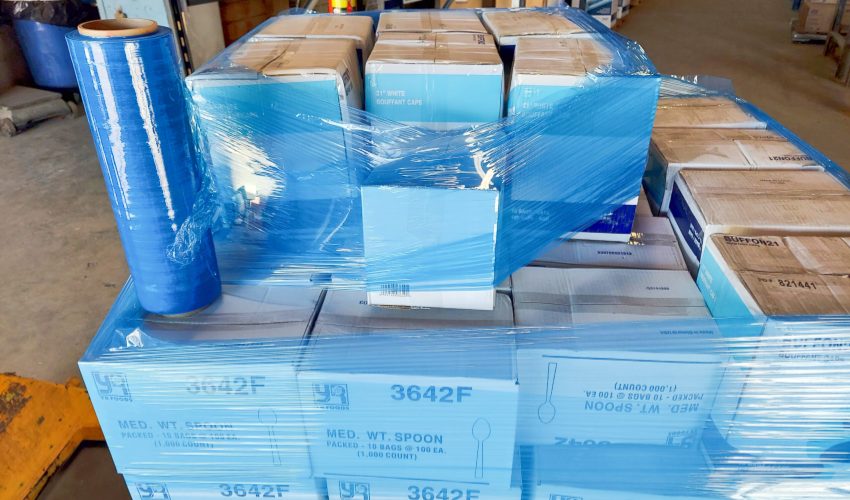
Stretch film bulk is a type of plastic film used extensively in packaging to secure, bundle, and protect products, especially during storage and transit. Bulk Stretch Wrap offers great tear resistance and break strength used to bind, bundle, and fasten items for moving and storage. Similar to the bundling stretch film, it is commonly used to wrap multiple items together, preventing them from shifting, reducing the risk of damage, and offering a reliable shield against dust, moisture, and contaminants. Stretch wrap in bulk is an ideal solution for businesses needing efficient, large-scale packaging options. Choosing bulk stretch wrap offers multiple advantages. First, buying in bulk can lead to significant cost savings, particularly for businesses with high packaging demands. It also helps reduce packaging waste, as stretch wrap is applied precisely where needed, minimizing excess materials. Bulk purchasing ensures that companies always have adequate wrap on hand, avoiding operational delays and streamlining the packaging process for improved efficiency and productivity.
Why Choose Our Stretch Film Over Competitors?
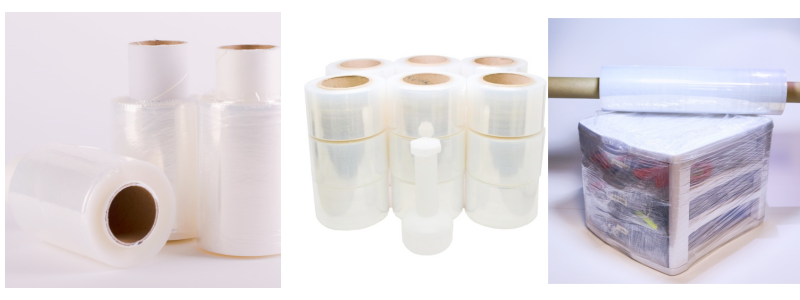
| Attribute | Description |
|---|---|
| Product Name | Stretch Wrap |
| Brand Name | PWP Stretch Film |
| Place of Origin | Fujian, China |
| Material Options | PE, LLDPE, LDPE |
| Type | Stretch Film |
| Length Options | Custom Length, 50m - 1500m, etc. |
| Width Options | Custom Widths |
| Thickness Options | 8mic - 50mic |
| Transparency | Transparent |
| Hardness | Soft |
| Feature | Moisture Proof, Durable, Tear Proof, Strong Tensile Strength |
| Surface Finish | Smooth, Glossy, High Gloss, Plain, Custom Finish |
| Tensile Strength | 0.0 - 50.0 MPa |
| Application | Industrial Use |
| Use | Hand Roll, Machine Roll |
| Processing Type | Casting, Blow Molding, Multiple Extrusion (5 layers) |
| Packaging Type | Carton or Pallet |
| Core Size | 1 inch - 3 inch Paper Core |
| Certifications | ISO 9001, MSDS, ROHS6 |
| Delivery Time | 15-20 Days (Depends on Order Size) |
| MOQ (Minimum Order Quantity) | 6 Rolls (for some variations), 1000kg (bulk orders) |
| Lead Time | 15-20 Days |
| Payment Terms | L/C or T/T |
Bulk stretch wrap is a highly versatile packaging material widely used in industries such as shipping, storage, and logistics. Its size specifications play a crucial role in ensuring optimal use and efficiency. Here’s a detailed explanation of the various size considerations for bulk stretch wrap:
The width of bulk stretch wrap typically ranges from 12 inches to 60 inches, depending on the application. Common widths include:
Thickness, measured in microns or gauge, determines the durability and strength of the wrap. Typical thicknesses include:
Stretch wrap roll lengths vary to accommodate different usage frequencies and packaging needs:
The core size of bulk stretch wrap is typically standardized for compatibility with dispensers or machines. Common core sizes include:
Roll weight is crucial for handling and storage:
The size of the stretch wrap can also influence the type:
Many manufacturers offer customizable sizes to meet specific industry needs. Custom orders can specify unique widths, thicknesses, or lengths to ensure the wrap perfectly suits the application.
By understanding the different size dimensions of bulk stretch wrap, businesses can choose the most efficient and cost-effective solution for their packaging needs.
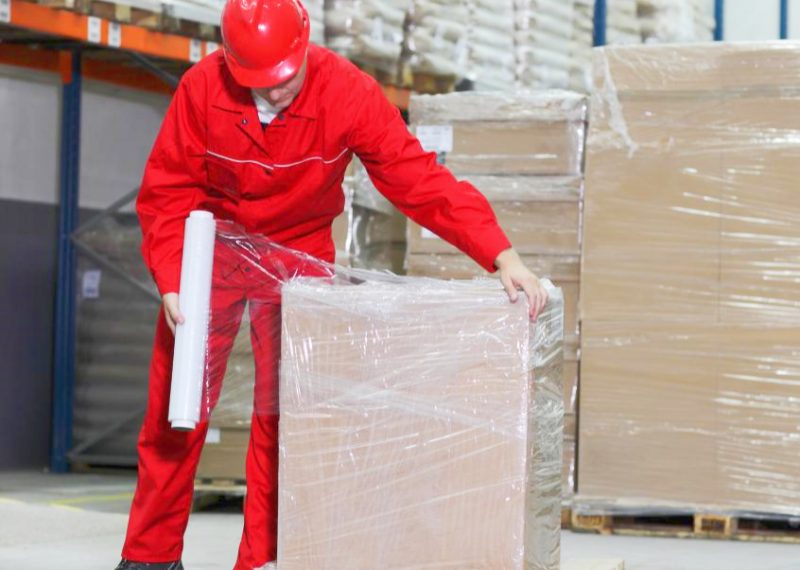
Bulk stretch wrap is an essential packaging material widely used in various industries due to its versatility, durability, and efficiency. Its unique features make it a preferred choice for securing and protecting goods during storage and transportation. Here’s an in-depth look at the key features of bulk stretch wrap:
The combination of elasticity, durability, protective qualities, and cost-efficiency makes bulk stretch wrap an indispensable tool for packaging and shipping. Its customizable features ensure that businesses can find the perfect solution for their unique requirements.
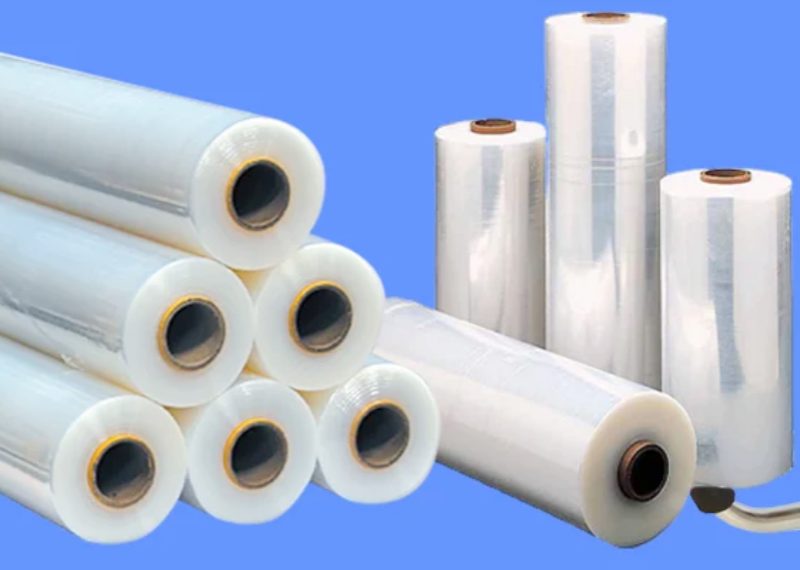
When purchasing bulk stretch wrap, it’s essential to understand the different types available to ensure you’re using the right product for your needs. Each type of stretch wrap has unique characteristics that make it suited for specific applications, from standard packaging to specialized requirements.
| Type of Stretch Wrap | Characteristics | Benefits | Uses |
|---|---|---|---|
| Cast Stretch Wrap | Excellent clarity, quiet application, lower costs | Allows easy content identification; economical option | Standard packaging for uniform loads |
| Blown Stretch Wrap | Higher puncture resistance, strong cling, durable | Ideal for irregular or heavy loads; superior hold | Heavy-duty packaging for challenging shapes |
| Specialty Wraps | UV-protected, colored/opaque, pre-stretched for reduced worker fatigue | Specific use cases: outdoor storage, security, worker ease | Outdoor storage, sensitive items, high-volume operations |
Purchasing bulk stretch wrap offers a range of advantages for businesses focused on efficient, cost-effective packaging solutions. Whether a business handles frequent shipments, needs to secure inventory, or requires consistent packaging materials on hand, buying in bulk provides multiple benefits.
One of the primary benefits of buying bulk stretch wrap is cost-effectiveness. Businesses with high packaging demands can significantly lower their per-unit costs by purchasing in bulk. Bulk purchases often come with wholesale discounts, helping businesses stretch their packaging budgets further. This approach also reduces the frequency of reordering, cutting down on administrative costs and saving on shipping fees that might accumulate with smaller, frequent orders. For high-volume operations, these cost savings can quickly add up, making stretch wrap in bulk a financially smart choice.
Ensuring a steady supply of stretch wrap is critical for businesses that rely on secure packaging to protect their products. Buying bulk stretch wrap allows businesses to maintain a consistent stock of materials, reducing the risk of running out during peak periods. With bulk quantities, packaging operations can continue smoothly without the downtime associated with waiting for new orders to arrive. This uninterrupted availability ensures that businesses can meet deadlines, improve productivity, and avoid costly delays due to supply shortages.
Buying bulk stretch wrap does not mean sacrificing variety; in fact, it often provides access to a broader selection of options tailored to different packaging needs. Bulk orders usually allow businesses to choose from a wide array of stretch wrap types, sizes, and thicknesses, such as cast, blown, or specialty wraps, depending on specific requirements. This flexibility ensures that businesses can stock the ideal stretch wrap for various applications—whether they need durable, puncture-resistant wrap for irregular loads or clear, economical wrap for everyday packaging. Access to this variety ensures that businesses have the right tool for any job, enhancing both efficiency and product protection.
Selecting the right bulk stretch wrap involves considering several key factors to ensure optimal packaging performance. By assessing the specific needs of your products and shipping conditions, you can choose the appropriate thickness, size, and specialty options for maximum protection and efficiency.
The gauge of stretch wrap refers to its thickness and durability, which is often specified as stretch wrap gauge thickness. Common thicknesses include 60, 80, and 120 gauge, each suited to different types of loads. For example, lighter loads and standard packages generally work well with a 60-gauge stretch wrap, offering adequate protection without added material costs. Heavier or irregularly shaped items benefit from thicker gauges, such as 80 or 120, which provide greater puncture resistance and load stability. When choosing bulk stretch wrap, selecting the appropriate gauge is crucial for safeguarding products during handling and transportation.
Choosing the correct size and width of bulk stretch wrap is essential for effective packaging. Rolls typically range from narrow 5-inch widths, ideal for bundling small items, to wider 18- or 20-inch rolls for securing large pallet loads. Selecting the correct width ensures an even application and minimizes waste, which contributes to overall packaging efficiency. Additionally, larger rolls mean fewer roll changes, reducing labor time and enhancing productivity. Companies can maximize their packaging process by matching roll size to the dimensions of the load and the desired application method.
For specific applications, specialty bulk stretch wrap options provide tailored solutions. UV-inhibited stretch wrap, for instance, is designed for outdoor storage, protecting products from sun exposure that could cause material degradation. Perforated stretch wrap, on the other hand, allows for breathability, making it suitable for items that may need airflow, such as produce or certain machinery. Other specialty options include tinted or opaque wraps to conceal package contents, and pre-stretched wraps, which reduce application time and minimize worker fatigue.
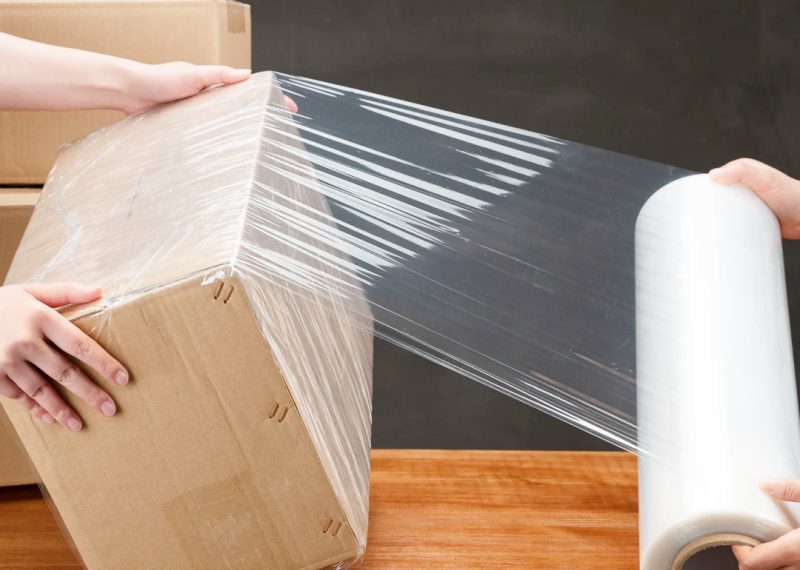
Finding the right bulk stretch film wholesale distributors is essential for securing affordable and reliable packaging materials. Below are some tips to guide you in selecting a distributor that meets your business needs.
Local distributors offer the advantage of reduced shipping costs and faster delivery. Searching for “bulk stretch film wholesale distributors near me” online is an excellent starting point. Additionally, reaching out to industry peers or trade organizations can provide recommendations for trusted local distributors. Many companies also offer consultations to help businesses determine the best stretch wrap options and quantities based on usage.
When sourcing cheap bulk stretch wrap from wholesale distributors, it’s essential to balance affordability with quality, especially when considering options like warehouse stretch wrap. This type of wrap offers reliable performance for securing loads while still being cost-effective for large-volume packaging needs. Look for established suppliers with positive reviews who prioritize durability and consistency. Cheaper options are available, but it’s important to verify that the materials meet your required performance standards, especially for heavy-duty or sensitive loads. Reputable wholesalers often offer sample rolls or trial runs to ensure the quality aligns with your packaging requirements.
Several factors come into play when evaluating bulk stretch wrap for sale from different distributors. Begin by comparing product specifications, such as gauge, size, and type, to confirm compatibility with your load requirements. Look for distributors that offer competitive bulk pricing, and check for minimum order quantities that align with your usage needs. Customer support is also vital—reliable distributors should provide timely assistance, answer questions, and address issues efficiently, ensuring a seamless purchasing experience.
When investing in bulk stretch wrap for your packaging needs, it’s essential to consider several key factors, including the availability of stretch wrap refill options, to ensure you choose a product that effectively protects your loads. From load stability to environmental challenges, selecting the right stretch wrap can make a significant difference in the safety and efficiency of your packaging process.
One of the primary considerations when choosing bulk stretch wrap is matching the type and thickness of the wrap to the stability requirements of the load. Heavier and irregularly shaped items require stretch wrap with a higher gauge for added strength and puncture resistance. For instance, items with rough edges or uneven surfaces will benefit from thicker, durable wrap, such as an 80 or 120 gauge, which can securely hold them in place without tearing. Lighter loads or standard pallets, on the other hand, can typically be stabilized with a thinner wrap, such as a 60 gauge, reducing material costs while still providing adequate security.
Environmental conditions are another crucial factor to consider when selecting bulk stretch wrap. If your products will be stored outdoors or exposed to harsh elements, it’s important to choose a wrap that can withstand these conditions. UV-inhibited stretch wraps, for example, are designed to resist damage from sunlight, making them ideal for outdoor storage or shipping where exposure to the elements is likely. High humidity or extreme temperatures may also require specialty wraps that maintain their integrity under such conditions, ensuring that your products remain secure and undamaged throughout the storage period. Selecting the right wrap for environmental conditions can help prevent degradation, maintaining the quality and effectiveness of your packaging.
Efficiency and ease of use are important, especially when handling large quantities of bulk stretch wrap in a high-volume environment. Some wraps come with ergonomic benefits that make the packaging process more manageable for workers, such as rolls with built-in handles for better grip or pre-stretched wraps that reduce the amount of effort needed to apply them. Pre-stretched wrap, in particular, is advantageous for reducing worker fatigue, as it requires less pull strength to achieve a tight wrap around the load. These user-friendly options can improve the speed and comfort of the wrapping process, making them an excellent choice for businesses focused on productivity and worker well-being.
The thickest stretch wrap commonly available on the market is 120 gauge, though even thicker options can be custom ordered if needed. Thicker stretch wraps, such as those at 100 or 120 gauge, are typically used for heavy-duty applications where products require a higher level of protection. These thick wraps are puncture-resistant and offer superior load containment, which makes them ideal for heavy, irregular, or sharp-edged items that might otherwise tear through standard stretch wrap. While a standard 80-gauge wrap is sufficient for most loads, choosing a thicker wrap is essential when shipping or storing items that are unusually heavy or at a high risk of damage. Businesses in industries like manufacturing or construction often rely on thicker stretch wraps for these more challenging packaging needs.
The amount of stretch wrap needed per pallet can vary based on several factors, including the size of the pallet, the type of load, and the thickness and width of the stretch wrap being used. On average, it takes between 100 to 150 feet of stretch wrap to wrap a standard pallet securely. For pallets with irregular or heavy items, more wrap may be needed to provide stability and prevent movement during transport. Pre-stretched wrap, which has already been extended, might reduce the amount required, as it provides good load containment with fewer wraps around the pallet. Using the right amount of stretch wrap per pallet is crucial for ensuring the safety of the load while optimizing material use and keeping packaging costs efficient.
Stretch wrap and stretch film refer to the same type of packaging material used to secure items during transit and storage, but they are often used interchangeably based on regional or industry-specific terminology. Both terms describe a flexible plastic film that adheres tightly around products or pallets, providing a protective barrier that holds items together. Stretch wrap is typically made from linear low-density polyethylene (LLDPE), a material known for its flexibility and strength. While stretch wrap is often used to refer to hand-applied films, stretch film may also encompass machine-applied films used in automated wrapping equipment. Whether referred to as stretch wrap or stretch film, the material serves the same purpose: securing items and protecting them from shifting, dirt, and moisture.
Hand wrap and stretch wrap essentially describe two different applications of the same material. Hand wrap, as the name suggests, is specifically designed to be applied manually. This wrap usually comes in smaller rolls that are easy to handle and apply by hand, making it ideal for low to moderate packaging needs where speed and flexibility are essential. Hand wrap is often used for smaller warehouses or businesses where items are packaged on-demand. Stretch wrap, on the other hand, is a broader term that includes both hand wrap and machine wrap. Machine wrap, as opposed to hand wrap, is designed for use in automated or semi-automated stretch wrap machines that can apply the wrap more quickly and consistently across multiple pallets. For high-volume operations, machine stretch wrap can save considerable time and reduce worker fatigue. Ultimately, the choice between hand wrap and machine wrap (under the stretch wrap category) depends on the volume of packaging and the resources available to the business.
Yes, a stretch wrap is worth it, especially for securing and protecting goods during transportation or storage. It helps prevent damage caused by shifting or exposure to dust, moisture, or other environmental factors. Stretch wrap is cost-effective and easy to use, making it ideal for businesses handling large quantities of products. It also enhances stability, keeping items tightly bound on pallets. For smaller-scale uses, it is just as beneficial for bundling or protecting smaller items. Its versatility and ability to reduce waste by minimizing product damage make it a valuable tool for any supply chain.
The cost of pallet wrap varies depending on its size, thickness, material, and brand. Generally, a standard roll of stretch wrap can cost between $10 and $50, with larger industrial-grade rolls costing more. Factors like pre-stretched or reinforced material may also impact the price. For businesses that purchase in bulk, prices may be lower per roll. Reusable or eco-friendly options are typically more expensive but may offer better long-term value. To find the best deal, compare prices based on your specific needs, such as load size and frequency of use.

My name is James Thompson, and I’m the editor of this website dedicated to Stretch Film, Pallet Wrap, and Stretch Wrap products.
My passion for packaging began when I noticed the challenges companies face in securing their products efficiently for transportation and storage. This inspired me to delve deep into the world of stretch films and pallet wraps, exploring the latest technologies and best practices.
I aim to provide valuable insights, practical tips, and up-to-date industry trends to assist you in making informed decisions. Whether you’re a small business owner or part of a large corporation, my goal is to support you in optimizing your operations and ensuring your products reach their destination safely.
Thank you for visiting, and I look forward to accompanying you on your journey toward better packaging solutions.
Comments are closed